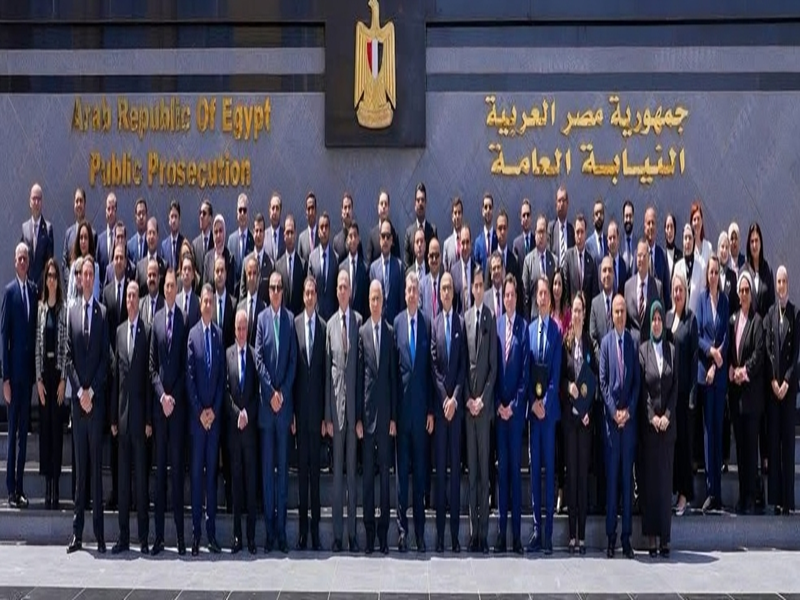Ain Shams University President Attends Public Prosecution's Community Integration and Academic and Knowledge Partnership Event
As part of implementing the Public Prosecution’s training strategy, particularly its focus on supporting scientific research and establishing international partnerships, and on the occasion of World Intellectual Property Day, the Public Prosecution held a ceremonial event at the Office of the Public Prosecutor in Cairo to launch two major initiatives: the Master’s Program in Intellectual Property Law, in collaboration with Ain Shams University, and the Training Impact Assessment Program, in partnership with the World Intellectual Property Organization (WIPO). This marks the first program of its kind that WIPO has offered to members of the Public Prosecution worldwide.
The event opened with a speech by Public Prosecutor Counselor Mohamed Shawky, in which he welcomed the esteemed guests and praised the efforts of all participating institutions, whether in academic, cultural, or societal contexts. He emphasized that continuous learning is a fundamental pillar in developing human resources and achieving excellence.
The event also featured the signing of a memorandum of cooperation between the Public Prosecution and the Egyptian Intellectual Property Authority to strengthen the technical and legal capabilities of Public Prosecution members in the field of intellectual property rights.
In his speech, Prof. Mohamed Diaa Zain El-Abedeen, President of Ain Shams University, affirmed that innovation and creativity are core values of the university. He noted that the name "Ain Shams" is derived from the ancient Egyptian name "O’n", one of the oldest academic institutions in history, established approximately 6,000 years ago. It served as a bastion of knowledge, especially in the fields of astronomy, engineering, and medicine.
He explained that this historical legacy continues to shape the university’s present, with innovation and creativity embedded into all development plans. The current strategic plan (2018–2023) includes a key pillar for enhancing education and learning through innovative and forward-thinking approaches, as well as encouraging scientific research and supporting innovation.
He highlighted that launching the Master’s Program in Intellectual Property Law at the Faculty of Law at Ain Shams University, in cooperation with the Public Prosecution, coincides with the launch of Egypt’s National Intellectual Property Strategy, which aligns with the transition to the “New Republic” under the leadership of President Abdel Fattah El-Sisi.
Prof. Zain El-Abedeen further explained that the university is constantly striving to enhance its role and activate its societal participation to support a knowledge-based economy. Recently, the university adopted several new initiatives to establish a modern creative environment, most notably the adoption of an intellectual property policy and the establishment of the ASU Innovation Hub. This is the first governmental university center for innovation-based entrepreneurship and job creation, founded with support from the Central Bank of Egypt. The center aims to achieve harmony and integration within the ecosystem of intellectual property and entrepreneurship, serving as an extension of the university to enhance the economic returns of innovative projects.
He added that the university’s intellectual property policy was developed in accordance with the highest international standards, particularly WIPO guidelines, and is consistent with the national legislative environment. The policy aims to ensure legal protection for the university community, enhancing their ownership rights and guaranteeing their use. It outlines procedures for obtaining, assessing, protecting, and managing intellectual property rights, and for collaborating with external parties. It also sets standards for sharing profits from the successful commercialization of intellectual and innovative rights, and mechanisms for ensuring respect for these rights. This contributes to boosting innovative research, encouraging inventions and new technologies, supporting agricultural and industrial productivity, facilitating technology transfer, and enabling access to new medications for combating diseases and viruses. These objectives align with Egypt’s Vision 2030, which aims to diversify the economy and achieve sustainable development goals.
The event also included the signing of a joint memorandum of cooperation between the Public Prosecution and European universities in Egypt, aiming to benefit from international expertise and enhance the academic capacities of Public Prosecution members.
Additionally, a memorandum of cooperation was signed with the United Nations Children’s Fund (UNICEF) to jointly develop and implement programs for skill development of prosecutors, train trainers, establish child-friendly rooms in prosecution offices, and implement unified procedures to promote the concepts of restorative justice and alternative measures to child detention, in line with Egypt’s international obligations.
A memorandum of understanding was also signed between the Public Prosecution and the German Agency for International Cooperation (GIZ) to hold a series of exchange workshops between Egyptian and German prosecutors focused on combating violence against women.
On the sidelines of the celebration, the Public Prosecution hosted a high-level delegation from Aristotle University of Thessaloniki, Greece, to explore avenues for joint cooperation in strengthening research capabilities among prosecutors in both countries.
The ceremony concluded with an exchange of commemorative shields between the Public Prosecutor and representatives of the participating entities.


.svg)

